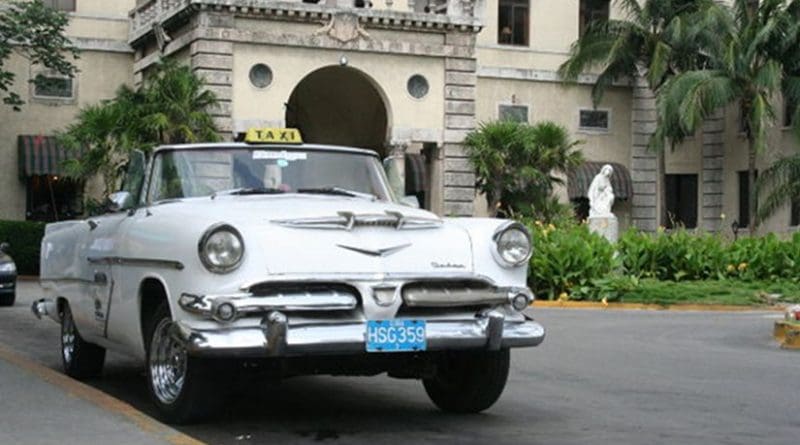Trump’s New Policy Toward Havana – OpEd
By Arab News
By Yossi Mekelberg*
It is hard to escape this strong feeling that US President Donald Trump has a long list of his predecessor’s policies and achievements that he is on a mission to undo. As months have gone by since Trump’s inauguration, one might have thought he would spare neighboring Cuba from this cull of Barack Obama’s policies. After all, Cubans have suffered enough from harsh and inexcusable US sanctions, imposed in 1960 and tightened over the years.
But last month, Trump announced that he was “canceling the last administration’s completely one-sided deal with Cuba.” At an event in Miami’s Little Havana, in a room packed with members of the Cuban community, and standing next to Sen. Marco Rubio and Rep. Mario Diaz-Balart — both Republicans who represent many Cuban-American voters — Trump unleashed a verbal onslaught toward Cuba.
Rubio and Diaz-Balart are known to be the architects of this change, lobbying for firm measures against Havana that would resemble those preceding the thaw in relations that started nearly three years ago. Trump left the impression of annulling a process of normalization between the two countries, which resumed diplomatic ties in July 2015.
A closer look reveals that in the hype of chastizing Cuba’s government and its President Raul Castro, measures taken are more likely to harm the nascent market-style economy than the intended official bodies.
Reverting to restrictions on tourism, trade and financial services has less to do with a genuine attempt to improve human rights and democracy on the island, and more to do with paybacks to the Cuban-American constituency, which was promised more punitive policies toward Havana in return for its support.
Cuba has always had unique, perilous ties with its northern neighbor. Long before the Castros led the 1959 revolution, Cuba was treated as an extension of the US that had to behave in full alignment with the interests and will of its more powerful neighbor. The history of bilateral relations experienced US invasion, occupation and imposition of laws. Past American presidents even offered to buy the island.
To this day, the US occupies Guantanamo Bay, where for years it has held terrorism suspects without trial. Cuba’s human rights record is less than satisfactory, especially regarding the treatment of dissidents or political prisoners and freedom of speech. But Cubans would rightly say human rights and democracy are just an excuse to bring down the government.
The new measures are a hotchpotch of the old punitive steps without, for instance, severing diplomatic ties or prohibiting visits by US citizens or direct flights that have just recently been introduced. As repeatedly witnessed in the past, these measures hit mainly ordinary Cubans and those with small enterprises.
Returning to permitting group travel via agencies, while prohibiting individuals from traveling independently, is bound to hurt private restaurants, tour guides and bed-and-breakfast rentals. Bigger businesses with closer links to the government are more likely to go unscathed.
Trump was very cautious not to harm the opportunities for bigger US businesses from investing. It is not only that the basic suppositions of his policies are unsound, but that the measures are inconsistent with the aim of weakening the Communist Party and the military.
The timing of the decision is most unfortunate, as the succession to Castro is on everyone’s mind, though very few will talk about it openly in Cuba. Castro said he will stand down in 2018. This would bring to a close nearly six decades of the Castros in power. Trump’s announcement of his new policy at this juncture can only negatively intervene in the process and strengthen the hands of those with strong anti-American sentiments.
It evokes the pain and misery inflicted by the US in its efforts to bring down Cuba’s government via economic strangulation, subversion and invasion. It did not achieve the desired results, and so failed as a policy.
Causing pain and misery through poverty to millions of Cubans is just not right. One could hardly find justification for it even during the Cold War. In its aftermath, it aims primarily to serve domestic US politics by gaining the Cuban vote, especially in the state of Florida. The gradual opening that started between the countries under the previous administration could potentially bring about constructive influence on changes in Cuba.
• Yossi Mekelberg is professor of international relations at Regent’s University London, where he is head of the International Relations and Social Sciences Program. He is also an associate fellow of the MENA Program at Chatham House. He is a regular contributor to the international written and electronic media.

